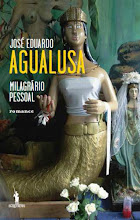como sempre para mim, reler um livro é um exercício meio estranho porque quase sempre dou por mim a devora-lo como se nunca o tinha lido antes.
ontem, terminei de reler Bono on Bono, que já o tinha lido em portugues na véspera daquele inesquecível concerto dos U2 a 14 de Agosto de 2005 no estádio de Alvalade. inesquecível não só porque realizei um sonho (até hoje tenho um “trauma” por ter visto a guitarra do Edge a chorar na musica Love is Blindness) mas também porque a companhia foi aquele pessoa especial.
Mas voltemos ao livro num dos excertos que passo ao copy:
(…)
I’m not sure we accept that Africans are equal.
(…)
God will not let us get away with this, history certainly won’t let us get away with our excuses. We say we can’t get these antiretroviral drugs to the farthest reaches of Africa, but we can get them our cold fizzy drink. The tiniest village, you can find a bottle of Coke. Look, if we really thought that an African life was equal in value to an English, French, or an Irish life, we wouldn’t let two and a half million Africans die every year for the stupidest of reasons: money. We just wouldn’t. and a very prominent head of state said to me: “It’s true. If these people weren’t Africans, we just couldn’t let it happen.” We don’t really deep down believe in their equality.
(…)
But why are westerners still trying to solve the problems of Africa? How come Africans aren’t doing it by themselves?
If we see aid as investment, and the debt burden of these countries as unjust, and offer fairer trade conditions, Africa will be able to take charge of its own destiny. The reason for the T for Trade in DATA is, in the end, aid is not the way forward for the poorest people in the world. Trade is the way forward. We have to let the poorest of the poor trade with us. And, at the moment, we’re not letting them trade fairly with us. So when you say, “Why can’t Africans look after themselves?,” that is the only way forward for Africa: Africans taking charge of their continent. But at the moment, we won’t let them! Even after twenty-tree countries whose debts we’ve canceled now, there are still countries paying back to the World Bank and the IMF more money every year than they’re spending on health and education. These are dignified people, and they wanna get up off their knees. But it’s us that has them chained to the ground!
(…)
mas mesmo assim, ainda penso que apesar de alguns dos problemas terem sido criados por outros, temos de ser nos os africanos a resolver aqueles problemas que hoje atiram África para o fundo do posso.
na Lunda-Norte os mais velhos dizem assim:
se não tens sal ou óleo, o vizinho pode de dar hoje, amanha e depois mas nunca para sempre.
ouvindo
Carla Bruni - at last the secret is out
ontem, terminei de reler Bono on Bono, que já o tinha lido em portugues na véspera daquele inesquecível concerto dos U2 a 14 de Agosto de 2005 no estádio de Alvalade. inesquecível não só porque realizei um sonho (até hoje tenho um “trauma” por ter visto a guitarra do Edge a chorar na musica Love is Blindness) mas também porque a companhia foi aquele pessoa especial.
Mas voltemos ao livro num dos excertos que passo ao copy:
(…)
I’m not sure we accept that Africans are equal.
(…)
God will not let us get away with this, history certainly won’t let us get away with our excuses. We say we can’t get these antiretroviral drugs to the farthest reaches of Africa, but we can get them our cold fizzy drink. The tiniest village, you can find a bottle of Coke. Look, if we really thought that an African life was equal in value to an English, French, or an Irish life, we wouldn’t let two and a half million Africans die every year for the stupidest of reasons: money. We just wouldn’t. and a very prominent head of state said to me: “It’s true. If these people weren’t Africans, we just couldn’t let it happen.” We don’t really deep down believe in their equality.
(…)
But why are westerners still trying to solve the problems of Africa? How come Africans aren’t doing it by themselves?
If we see aid as investment, and the debt burden of these countries as unjust, and offer fairer trade conditions, Africa will be able to take charge of its own destiny. The reason for the T for Trade in DATA is, in the end, aid is not the way forward for the poorest people in the world. Trade is the way forward. We have to let the poorest of the poor trade with us. And, at the moment, we’re not letting them trade fairly with us. So when you say, “Why can’t Africans look after themselves?,” that is the only way forward for Africa: Africans taking charge of their continent. But at the moment, we won’t let them! Even after twenty-tree countries whose debts we’ve canceled now, there are still countries paying back to the World Bank and the IMF more money every year than they’re spending on health and education. These are dignified people, and they wanna get up off their knees. But it’s us that has them chained to the ground!
(…)
mas mesmo assim, ainda penso que apesar de alguns dos problemas terem sido criados por outros, temos de ser nos os africanos a resolver aqueles problemas que hoje atiram África para o fundo do posso.
na Lunda-Norte os mais velhos dizem assim:
se não tens sal ou óleo, o vizinho pode de dar hoje, amanha e depois mas nunca para sempre.
ouvindo
Carla Bruni - at last the secret is out








Sem comentários:
Enviar um comentário